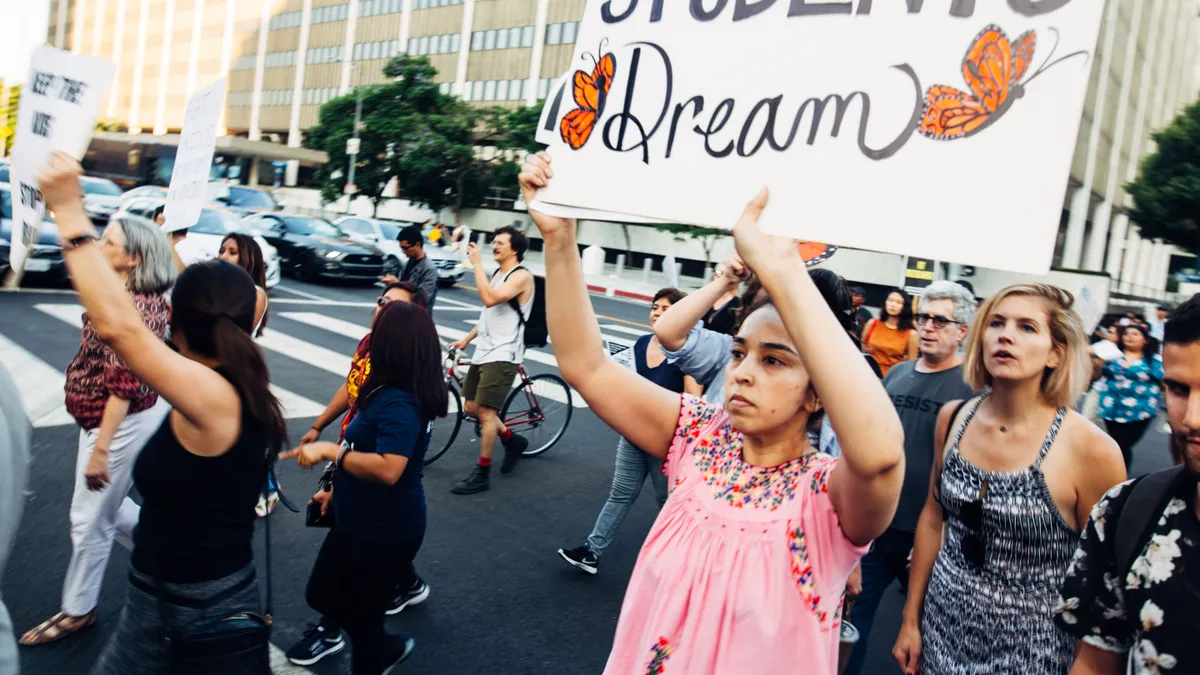Dive Brief:
- More than 450,000 students unauthorized to live in the U.S. are attending a college or university here, making up roughly 2% of enrollment, according to a new report from advocacy groups New American Economy and the Presidents' Alliance on Higher Education and Immigration.
- Of those students, about half are eligible for or are participating in Deferred Action for Childhood Arrivals (DACA), a program that allows immigrants brought to the U.S. illegally as children to study and work here and shields them from deportation.
- The report notes that unauthorized students can't receive public grants at some state universities and don't qualify for federal financial aid — two concerns that have taken on new urgency amid the coronavirus pandemic.
Dive Insight:
The unauthorized student population is much larger "than was previously thought," the report's authors write. They added that these students "actively ready themselves to fill critical skills shortages" in fields such as healthcare and teaching.
Yet several financial hurdles can prevent them from finishing or even enrolling in college. They aren't eligible for federal aid, and fewer than half of the states offer all unauthorized students in-state tuition if they meet residency requirements.
The coronavirus pandemic has heightened these issues. Although the U.S. Department of Education is giving colleges more than $6 billion to distribute to students, the agency hasn't explicitly stated whether unauthorized students are allowed to receive these funds, Inside Higher Ed reported.
However, the wide latitude the Ed Department is giving colleges to determine how to distribute the aid could allow them to help unauthorized students and others who aren't typically eligible for federal support.
The Ed Department did not cap the amount colleges could give to each student, but suggested they limit it to $6,195, the maximum Pell Grant amount.
Unauthorized students' families may also be missing out on government coronavirus relief, potentially jeopardizing their college education. Immigrant workers without social security numbers don't qualify for the checks of up to $1,200 being sent to many Americans and can't file for unemployment benefits in most states.
Efforts have sprung up to fill in the gaps. California is giving one-time payments of $500 to unauthorized immigrants in the state, with a cap of $1,000 per household. And several universities and advocacy organizations have emergency funds set aside for unauthorized students.
The possible end of DACA also hangs over some unauthorized students. When the U.S. Supreme Court heard oral arguments over the case last year, the justices appeared divided on whether the Trump administration lawfully attempted to phase out the program.
In the wake of the coronavirus pandemic, lawyers from the National Immigration Law Center and other groups argued in court documents that the administration did not fully consider the contributions of roughly 27,000 healthcare workers who are shielded from deportation by DACA.
And late last year, the Association of American Medical Colleges (AAMC) and 32 other healthcare associations voiced their support of DACA to the Supreme Court justices. "[W]e do not believe the administration considered the impact the rescission of DACA would have on patients and the health professionals who care for them," David Skorton, president and CEO of the AAMC, said in an op-ed for The Washington Post.
The new report builds on those arguments. Nearly half (46%) of DACA-eligible graduate students with a STEM undergraduate degree have one in a healthcare-related field, its authors note.










